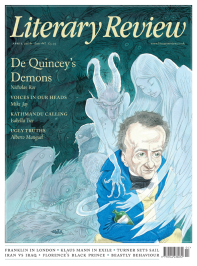Anthony Sattin
The End of the Silk Road
Aleppo: The Rise and Fall of Syria's Great Merchant City
By Philip Mansel
I B Tauris 250pp £17.99
In 2010, Philip Mansel published Levant, a wide-ranging history of three Mediterranean cities: Alexandria, Beirut and Izmir. In that book, he identified common factors that made these cities distinctly Levantine, in particular diverse ethnicities and cultures, wide trade links and loose Ottoman control. He might have added Aleppo to the trio.
If he had written about Aleppo six years ago, he might have mentioned a spirit of optimism. Great efforts had been made to restore some of the fabric of the old city: the German non-governmental organisation GTZ, the architect Adli Qudsi, the Friends of Aleppo Citadel and many others were seeing to that. Experts from the Royal Academy had been trawling the city for potential loans for a Syria exhibition due to open in London in 2013. Many old houses were being restored – the shoe designer Christian Louboutin had bought one and the musician Julien Weiss was already installed in another – and some old municipal buildings were being turned into large hotels. There was even talk of Baron’s, the favourite bolthole of Agatha Christie, T E Lawrence and many others, having a makeover. Above all, there was optimism that money coming in would bring wider change. The descent of Syria into civil war and the subsequent destruction of much of Aleppo have made this a very different book to one that might have been written in 2010.
Aleppo is a short book of uneven halves. The second and larger section is made up of extracts from other books. Entitled ‘Through Travellers’ Eyes’, it would make a useful companion to Marius Kociejowski’s Syria: Through Writers’ Eyes. The passages here come from the Ottoman period, ranging from Leonhard Rauwolff’s

Sign Up to our newsletter
Receive free articles, highlights from the archive, news, details of prizes, and much more.@Lit_Review
Follow Literary Review on Twitter
Twitter Feed
Alfred, Lord Tennyson is practically a byword for old-fashioned Victorian grandeur, rarely pictured without a cravat and a serious beard.
Seamus Perry tries to picture him as a younger man.
Seamus Perry - Before the Beard
Seamus Perry: Before the Beard - The Boundless Deep: Young Tennyson, Science, and the Crisis of Belief by Richard Holmes
literaryreview.co.uk
Novelist Muriel Spark had a tongue that could produce both sugar and poison. It’s no surprise, then, that her letters make for a brilliant read.
@claire_harman considers some of the most entertaining.
Claire Harman - Fighting Words
Claire Harman: Fighting Words - The Letters of Muriel Spark, Volume 1: 1944-1963 by Dan Gunn
literaryreview.co.uk
Of all the articles I’ve published in recent years, this is *by far* my favourite.
✍️ On childhood, memory, and the sea - for @Lit_Review :
https://literaryreview.co.uk/flotsam-and-jetsam